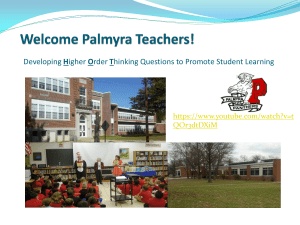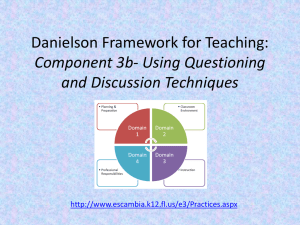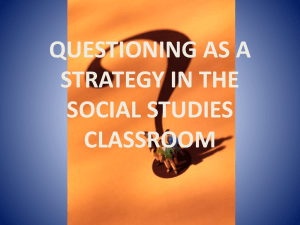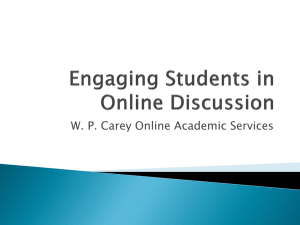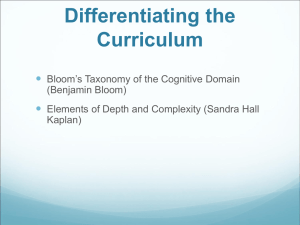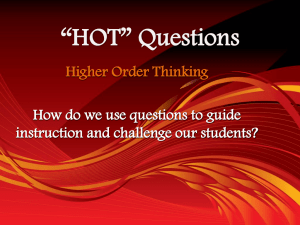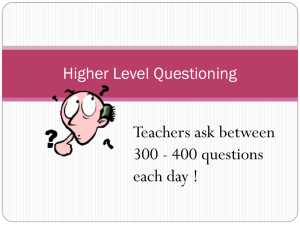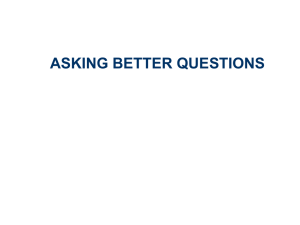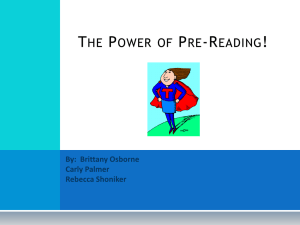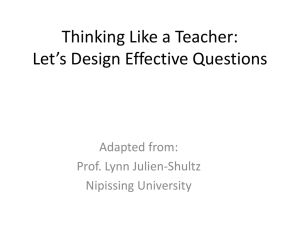Higher Order Thinking Presentation
advertisement
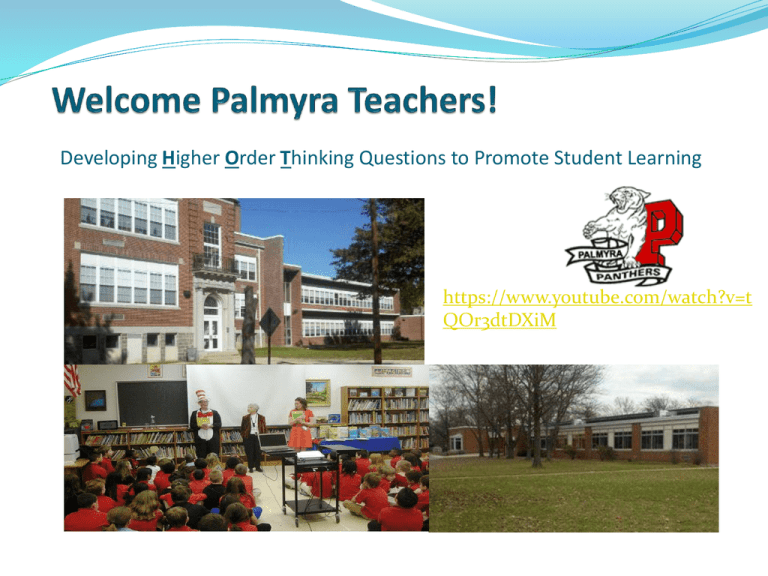
Developing Higher Order Thinking Questions to Promote Student Learning https://www.youtube.com/watch?v=t QOr3dtDXiM Background on Your Presenter! Steve Buono – steveb53@verizon.net 12 years teaching experience 25 Years School Administration Retired from Washington Twp. School District in 2013 Objectives: Teachers will be able to: 1. Define and develop higher order questions. 2. Identify the purpose of using higher order questions in the classroom. 3. Understand the difference between Higher order questions and essential questions 4. Practice scaffolding questions 5. Identify at least two examples of how to use higher order questions in the classroom. 6. Articulate the benefits of using higher order questions in the classroom. What is higher order thinking? Higher order thinking essentially means thinking that takes place in the higher-levels of the hierarchy of cognitive processing. Benjamin Bloom “While questions which elicit lower level thinking are an important part of teaching, they are useless unless they build toward questions which help kids develop higher order thinking skills.” Benjamin Bloom Higher Order Thinking is: Thinking using the 3 upper levels of Bloom’s Taxonomy: Analyzing Evaluating Creating Scaffolding to Higher Thinking Levels Bloom’s Taxonomy Level 2 Create Evaluate Analyze Apply Level 1 Understand Remember Revised Bloom’s Taxonomy Foundational Knowledge - facts and recall of who, what, when, where (recalling, recognizing, remembering). Testing students' recall and recognition, ways and means of dealing with specifics (conventions, trends and sequences, classifications and categories, criteria, methodology). Comprehension – understanding how and incorporating contextual information (understanding, conceptualizing, discussing, explaining, relating). Grasping or understanding the meaning of informational materials. History/Social Studies Literacy & the Common Core 2012 9 Revised Bloom’s Taxonomy Application - transfer and use (applying, interpreting, demonstrating, practicing, implementing). Applying previously learned information (or knowledge) to new and unfamiliar concrete situations to solve problems that have single or best answers. http://www.youtube.com/watch?v=NsBna5IVBYg JS Analysis - the interrelationship and interdependence of components and contextual variables that explain the why of events and issues (analyzing, organizing, examining, deconstructing, differentiating, attributing). Breaking down information into parts, or examining (and trying to understand the organizational structure of) information. identifying motives or causes, making inferences, and/or finding evidence to support generalizations. Revised Bloom’s Taxonomy Evaluation- the evaluation of evidence to develop hypotheses, form opinions, make judgments, and engage in reasoned decision-making (evaluating, checking, critiquing, prioritizing, deciding, determining, defending). Judging the value of material based on personal values/opinions, resulting in an end product, with a given purpose, without real right or wrong answers. To encourage students to make judgments according to a set of criteria. Synthesis/Create - combining ideas, concepts, and information in new ways and the use of meta-cognitive thinking for perspective (creating, connecting, arranging, proposing, hypothesizing, planning, formulating, producing). divergently applying prior knowledge and skills to produce a new or original whole. Applying prior knowledge and skills to combine elements into a pattern not clearly there before. Handouts\1 Bloom's Question Stems.docx Handouts\2 blooms-question-starters.docx Who Needs To Be a Good Questioner? Reporter Scientist Doctor Lawyer Auto Mechanic Presenter Teacher and STUDENT! Handouts\3 Effective Questioning Practices handout.docx Classroom Norm Designing higher order questions requires planning time. Coal Breaker Boys A breaker boy was a coal-mining worker in the United States[1] and United Kingdom whose job was to separate impurities from coal by hand in a coal breaker. Although breaker boys were primarily children, elderly coal miners who could no longer work in the mines because of age, disease, or accident were also sometimes employed as breaker boys.[2] The use of breaker boys began in the mid1860s.[3][4]Although public disapproval of the employment of children as breaker boys existed by the mid-1880s, the practice did not end until the 1920s. http://www.learnnc.org/lp/media/article s/bloom0405-3/bloompix.html Why should teachers use high-level questions to differentiate instruction? Questioning is the most powerful tool in a teaching repertoire. High-level, open-ended questions lead to better student understanding. Quality, thoughtful questions set high expectations and promote critical and creative thinking as well problem solving. Teachers can challenge every student by differentiating with effective questioning. Questions????????? Usually questions at the lower levels are appropriate for: –Evaluating students’ preparation and comprehension. –Diagnosing students’ strengths and weaknesses. –Reviewing and/or summarizing content. Questions at higher levels are usually more appropriate for –Encouraging students to think deeply and critically. –Problem-solving. –Encouraging discussions. –Stimulating students to seek information on their own. Ken Halla and Dan Moirao, CalState Technology Enhancement Project http://cstep.csumb.edu/Obj_tutorial/bloomwheel.html Need for Problem Solving Ability Thinking analytically is a skill like carpentry or driving a car. It can be taught, it can be learned, and it can improve with practice. But like many other skills, such as riding a bike, it is not learned by sitting in a classroom and being told how to do it. http://www.cia.gov/csi/books/19104/art4.html Analyzing Stems (Level 4) Questions… Which events could not have happened? If. ..happened, what might the ending have been? How is...similar to...? What do you see as other possible outcomes? Why did...changes occur? Can you explain what must have happened when...? What are some or the problems of...? Can you distinguish between...? What were some of the motives behind..? What was the turning point? What was the problem with...? What motive does ____ have...? What conclusions can you draw about...? What is the relationship between...? What evidence can you find...? What inferences can you make about...? What is the theme of...? (Pohl, Learning to Think, Thinking to Learn, p. 13) Analyzing Text: Video “Text Talk Time” Analyzing Text as a Group Lesson 7:00 What routines Ms. Brewer have in place to help discussion to run smoothly? Notice the questions Ms. Brewer asks her class. What makes these questions rich? Why is it beneficial to engage students in both in both small and large group discussions before writing? Analyzing Verbs Distinguish Question Appraise Experiment Inspect Examine Probe Separate Inquire Arrange Investigate Sift Research Calculate Criticize Discriminate Classify Differentiate Infer Outline Focus Compare Contrast Survey Illustrate Detect Prioritize Group Order Sequence Test Debate Analyze Diagram Relate Dissect Categorize Correlate Products Questionnaire Database Abstract Report Graph Spreadsheet Checklist Chart Outline Comparison Graphic organizer (Tarlinton, 2003) Analyzing Project Ideas Use a Venn Diagram to show how two topics are the same and different Design a questionnaire to gather information and analyse the results Make a flow chart to show the critical stages of an event or story plot Classify the actions of the characters in the book Construct a graph to illustrate selected information Make a family tree showing relationships Conduct an investigation to produce information to support a point of view Review a work of art in terms of form, color and texture Create a Decision Making Matrix to help you decide which breakfast cereal to purchase (Tarlinton, 2003) Evaluating Verbs Judge Rate Validate Predict Assess Score Revise Infer Determine Prioritize Tell why Compare Contrast Evaluate Defend Select Measure Interpret Support Choose Conclude Deduce Debate Justify Recommend Discriminate Appraise Value Probe Argue Decide Critique Rank Reject Explain Reframe Summarize Products Debate Panel Report Evaluation Investigation Verdict Conclusion Persuasive speech (Tarlinton, 2003) Evaluating Stems (Level 5) Questions Is there a better solution to...? Judge the value of... What do you think about...? Can you defend your position about...? Do you think...is a good or bad thing? How would you have handled...? What changes to.. would you recommend? Do you believe...? How would you feel if. ..? How effective are. ..? What are the consequences..? What influence will....have on our lives? What are the pros and cons of....? Why is ....of value? What are the alternatives? Who will gain & who will loose? What criteria would you use to assess……. How would you determine… How could you verify….. What information would you use….. What data was used to verify….. (Pohl, Learning to Think, Thinking to Learn, p. 14) Evaluating Project Ideas Persuasive presentation for a new school rule/suggesting changes needed Prepare and conduct a debate Prepare a list of criteria to judge Presentation about five rules you see as important and convinces others of their importance Write a half-yearly report evaluating personal progress Evaluate the character’s actions in the story (Tarlinton, 2003) Creating Verbs Compose Assemble Organize Invent Compile Forecast Devise Develop Propose Construct Plan Prepare Originate Connect Combine Facilitate Hypothesize Integrate Model Validate Modify Initiate Formulate Design Improve Act Predict Produce Formulate Blend Set up Devise Concoct Compile Imagine Generate Communicate Express Incorporate Products Debate Panel Report Evaluation Investigation Verdict Conclusion Persuasive speech (Tarlinton, 2003) Creating Stems (Level 6) Questions Can you design a...to...? Can you see a possible solution to...? If you had access to all resources, how would you deal with...? Why don't you devise your own way to...? What would happen if ...? How many ways can you...? Can you create new and unusual uses for...? Can you develop a proposal which would...? How would you generate a plan to...? What alternative would you suggest for...? (Pohl, Learning to Think, Thinking to Learn, p. 14) Creating Project Ideas Invent a machine to do a specific task Design a robot to do your homework Create a new product. Give it a name and plan a marketing campaign. Write about your feelings in relation to... Write a TV show play, puppet show, role play, song or pantomime about.. Design a new monetary system Develop a menu for a new restaurant using a variety of healthy foods Design a record, book or magazine cover for... Sell an idea Devise a way to... Make up a new language and use it in an example Write a jingle to advertise a new product Handouts\4 Bloom's Activities&Products.docx Handouts\5 Bloom's Verbs.docx http://www.youtube.com/watch?v=NsBna5IVBYg JS (Tarlinton, 2003) CREATING HOT Q’S EQUATION: Question Stem + What you want them to know ___________________________ = High Order Thinking Question EXAMPLE: How would you improve + your muscular endurance to become a better football player? _______________________________ = How would you improve your muscular endurance to become a better football player? (creating) In what classroom situation would you use higher order questions? a) Whole group discussion. b) Small group discussion. c) Seminar. d) Tests, both multiple choice and constructed response. e) Study guides. Present your students with at least 3 high order thinking questions per lesson. This is “proof” that you are presenting your students with challenging questions and meeting the needs of your advanced learners! Tips for Creating High-Level Questions The following simple tips can get ALL students involved in the lesson and help them gain a deeper understanding of the content by challenging them to think critically. Create a “HOT” Question for Each Lesson Require ALL students to answer the question Require students to defend answers. Differentiate questions as appropriate. Promote examination of new and different perspectives. Handouts\6 Graphic Organizer.docx GRAPHIC ORGANIZER STEM KNOWLEDGE How can you classify/categorize triangles according to their characteristics? What facts can you compile to support that idea that if the slaves were never set free, our country would be very different from what it is today? Can you identify all the planets in the solar system? What are the parts of the circulatory system and what is it’s function? Why do you think this composer may have chosen to use whole notes at the end of each bar in this HOT OR NOT (JUSTIFY) GRAPHIC ORGANIZER STEM KNOWLEDGE How can you evaluate the impact of the signing of the Emancipation Proclamation had on the estates of southern slave owners? What is the most important part of the circulatory system? Why? Give evidence to support. HOT OR NOT (JUSTIFY) Break! LET’S MAKE IT HOT!! Using the 3 highest levels of New Bloom’s, create 3 high order thinking questions that will support a lesson you plan to teach next week. https://www.youtube.com/watch?v=tQOr3dtDXiM (Hot, Hot, Hot) Questioning Strategies That Provoke HOT •Require students to manipulate prior information •Why do you suppose…..? •“What can you conclude from the evidence? •Ask students to state an idea or definition in their own words. •Ask questions that require a solution to a problem. •Involve students in observing and describing an event or object. •“What do you notice?” •“Tell me about this.” •“What do you see?” •Ask students to compare or contrast. SUMMARIZING STRATEGY “A good teacher makes you think even when you don’t want to.” (Fisher, 1998, Teaching Thinking) (How does this quote relate to how we must instruct our students?) Develop Higher Level Understanding Through Effective Questioning - Video https://www.youtube.com/watch?feature=player_embedded&v=IfEU5s hbmbw 10:28 Use a variety of Questions Ask higher-level questions at multiple levels of Bloom’s Taxonomy Students offer meaningful responses to higher level questions. Students pose higher-level questions to the teacher and each other Classroom Norm Students should receive direct instruction on how to formulate higher order questions. Classroom Norm Responding to higher order questions requires extended think and wait time. Effective Questioning Techniques Increase Think time and Wait time After framing the question, pause while everybody has a chance to think of an answer Talk less, ask more Move from simple to complex Give opportunities for rethinking and restating Avoid “yes or no” questions Let students prepare or discuss higher level questions Don’t let a few students dominate the conversation/questioning/answering Examples Just by increasing wait time by three to five seconds, teachers can… Increase student achievement Increase number of higher cognitive responses Increase contributions by non-participatory students Developing critical thinking and enhancing creativity Scaffold learning with rich input (thoughts and language) to prepare or activate students Use recall questions first to be sure the students have the knowledge. Then proceed to comprehension and analysis questions. Follow those up with evaluation/creative questions. 43 Scaffolding Instruction Two types of scaffolding – Verbal and Procedural: Verbal scaffolding uses strategies such as prompting, questioning, and elaboration to facilitate student's movement towards higher levels of language. Procedural scaffolding incorporates one-to-one teaching, small group instruction, partnering and cooperative learning. Questions to Ask Yourself How can I engage students in higher order thinking? How can I scaffold students learning so that they move from basic knowledge to deep understanding? How can I encourage students to become more autonomous learners? TYPES OF QUESTIONS: THE ESSENTIAL QUESTION -VSHIGH ORDER THINKING QUESTIONS Essential Questions Higher Order Questions Concepts or skills in the form Questions that are embedded of a question (replaces the objective). Organizes and sets the focus of the lesson. A tool to help teachers to gather evidence of learning. into the lesson at certain points during instruction. Provide opportunities for students to be challenged. May be used to determine direction of instruction. When Developing Essential Questions - ASK YOURSELF… What is the intended goal of the lesson? What do I expect my students to know by the conclusion of the lesson? ESSENTIAL QUESTION (SESSION QUESTION): How do we develop and essential questions? How do we use questions to guide instruction and challenge our students? ESSENTIAL (examples)…. How do readers use authors’ clues to make inferences? Why are carbohydrates important for your body? What were the advantages of both the North and South during the Civil War? How do you distinguish between a habitat and a niche? How do I graph quadratic functions? How does the wind help and hurt us? How are animals alike and different from us? Why are whales endangered and how can we protect them? Why have we, in our society, forced animals to live in cities? How can we accomplish our dream job? How will learning about the stars help us to learn more about the Earth? NOT ESSENTIAL … What is an inference? List 10 carbohydrates Who was involved in and won the Civil War? What is a habitat? What is a niche? Can you graph a quadratic equation? Classroom Norms All students should be engaged in asking and responding to questions. Scaffolding: Using Different Types of Questions Literal Questions Encourage students to become aware of the information in the text. Open-ended Questions Encourage students to extend their thinking about the text and to elaborate as they discuss the text. Answering/Asking Different Types of Questions SIMPLE Level One Text to Text: involve responses that can be found word-for-word in the text (literal) Level Two Text to Text: can be answered by looking in the text, but the answers are more complex and require a response of one sentence or more COMPLEX Level Three Text to Self or Text to World: cannot be answered by looking in the text; they require students to think about what they have read, think about what they already know, and think about how it all fits together Scaffolding QuestionsLittle Questions that Hold Up the Big One Work backwards from the essential question to come up with supporting questions Limit your number of supporting questions K-2nd three to five 3rd-5th five to eight Why have we, in our society, forced animals to live in cities? Supporting Questions 1. What is city wildlife? 2. Where do they live in the city? 3. What do wildlife in the city eat? 4. Why do people "feed" these critters? 5. What plants grow wild in the city? 6. What wildlife is found in your backyard or on your school ground? 7. What changes have we caused in our environment that affect wildlife? Subsidiary Questions • Subsidiary Questions help us build answers to our essential questions. • Big (essential) questions lead to smaller (subsidiary) questions for providing insight. A Few Examples . . . What’s the worst that can happen if . . .? What are the potential benefits of . . .? What are the available resources to . . .? ESSENTIAL QUESTION REMINDERS… Goal-to be answered by the end of the lesson or unit One per lesson or unit May take more than a day (or two) to answer Cannot be a answered with a simple “yes” or “no” Rigor and Essential Questions Q U E S T I O N QUALITY: Essential questions should be clear, relevant, and written in kid language. UNDERSTANDING: Essential questions should tie directly to enduring understandings. EXPLORATION: Essential questions should promote students digging deeply into the content. SPARK CONVERSATION: Essential questions should encourage debate and discussion. THINKING CREATIVELY: Essential questions prompt students to seek new possibilities. ITERATIVE: Essential questions should be revisited throughout the unit as students' understandings grow. OPEN-ENDED: Essential questions do not have one right answer. NURTURES HIGHER ORDER THINKING: Essential questions frequently ask students to consider "why," "to what extent," and "how." NOW YOU TRY… Write an essential question that reflects a concept or skill you will teach in the upcoming week. Handouts\7 Scaffolding Higher Order Thinking Skills.docx Handouts\7a SCAFFOLDING STRATEGIES.docx Questions Allow us to make sense of the world. They are the most powerful tools we have for making decisions and solving problems, for inventing, changing and improving our lives as well as the lives of others. Jamie McKenzie How do I foster higher-order thinking in my classroom? 1. Set up a classroom environment which is conducive to high-level thinking. A. Multi-level materials B. Flexible grouping C. Accept and celebrate diversity D. Print-rich environment E. High expectations F. Teacher as co-learner G. Nurture risk-taking 2. Engage students in activities which foster high-level thinking. The important thing is not to stop questioning ~ Albert Einstein Quick Tips for Integrating High Level Questions into Instruction Ask the student/class a thought-provoking question, asking students to reflect before responding. Reverse the order. Offer student(s) the answer, and ask, “What is the question?” Employ the use of “What if…” to encourage student(s) to expand and extend answers. Get students in on the act of writing questions. If you assign a reading assignment for homework, have students prepare questions for next day’s review using Bloom’s Taxonomy. How do I foster higher-order thinking in my classroom? A. Collaborative group activities in which students can communicate with others in a variety of ways. B. Problem-solving activities that require more than routine calculations. C. Open-ended activities with more than one "right" answer. D. Activities which accommodate multiple intelligences. E. Activities in which both genders participate freely. 3. Construct questions that call for high-level thinking. A. Ask yourself, "Do I always know the answer to my questions?" B. Use a variety of assessment methods that match teaching strategies. For example, use a project for assessment instead of an end-of-unit test. Questioning Session with Students Guide their thinking Steer them towards the big picture Give them Think Time Record questions Think about the relationship of their questions to the essential and supporting questions If you keep working at it—they will generate the right questions. https://www.teachingchannel.org/ videos/developing-betterquestions 2:00 Sample Strategies that Allow All Students to Participate: Turn and Talk - Video 1:22 Handouts\8 Benefits of Using Student Response Systems.docx Handouts\9 Think-Pair Share.docx Personal erasable whiteboards 66 Classroom Norm Students should be taught and expected to ask each other higher order questions. What is Technology-enriched Instruction? Promotes students’ comprehension in content areas Connects learning in the classroom to real-life situations (multimedia) Creates a meaningful context for teaching and learning Facilitates auditory skill development (integrating visual with sound) Accelerates language development Developing Multiple Choice Questions Sample multiple choice question formats: Use A,B,C,D as choices: Which best describes . . . Which does not describe.. Which is the best estimate... Which condition clearly demonstrates . . . Which piece of evidence… Which best clarifies… Handouts\10Ten Rules for Developing Multiple Choice Questions.docx Which statement best reflects… What meaning is intended… Which best supports… Which would most likely/least likely … Which of the following must be true when . . . If . . ., Then . . Developing Open-ended Questions -PARCC Each open-ended question is composed of three parts. 1. Question Stem: This is a thesis statement, main idea, or fact from the article/story/passage/text. This serves to jog the memory of the student and sets the stage for the specific questions to follow in bullets. 2. Bullets: This is where the specific information is included to guide the student in responding to the question. The NJASK uses 2 or 3 bullets for each question stem. Some examples might include: • What are the most important issues that... • Explain how... • How might the effects... • Choose one... 3. Concluding statement: All PARCC questions end with a statement similar to: Use information from the text to support your response. http://practice.parcc.testnav.com/# Students must have access to the text, article or story in order to answer the question and draw examples from the material. On-Line Educational Resources https://www.edmodo.com/ http://www.socrative.com/ Padlet – On-Line Collaborative Tools http://padlet.com/steveb53/kxf76517dkwe/wis h/34063732 http://fur.ly Moodle - http://moodle.org Intel® Teachers Engage Online Community - http://www.intel.com/content/www/us/en/e ducation/educators.html More Online Resources http://www.purposegames.com/games http://www.studystack.com/ http://quizlet.com/ www.education.com (worksheets) Prez1 Presentations - www.prezi.com Timer - http://www.online- stopwatch.com/countdown/ Games... are activities comprised of competition, engagement, and immediate rewards. support academic work when designed in such a way that learning objectives are integral to game play. may be used to energize the classroom, increase interest in a topic, and motivate student learning. use score-keeping elements or completion prerequisite conditions to encourage students to monitor their own progress. promote intrinsic motivation through challenge, curiosity, control and fantasy. offer immediate rewards, such as points, descriptive feedback, recognition, or victory. Why Use Games? Handouts\11 Why Use Games.docx http://people.uncw.edu/ertzbergerj/all.html games for questioning/review, many are free Classroom Norm Responding to higher order, think and search questions requires a low-risk environment. . A mirror 76 Skills demonstrated in asking questions : Have I asked questions which are at an appropriate level for the materials being covered? Did the questions I asked serve the intended teaching objectives? Have I asked questions which required students to think at different intellectual levels? 77 Skills demonstrated in phrasing questions and handling students’ responses: Have I allowed adequate, appropriate wait- time after posing questions in class? Have I reinforced students’ responses positively and effectively? Have I given students effective feedback which helps/guides them to reflect on their learning? 78 Overall Reflection: What specific problems have I encountered when asking questions or giving feedback during lessons? What are the strengths and weaknesses of my techniques for questioning and giving feedback? How can I improve my questioning and feedback techniques? 79 Need for Problem Solving Ability Because the pace of societal change shows no signs of slackening, citizens of the 21st century must become adept problem solvers, able to wrestle with ill-defined problems and win. Problem-solving ability is the cognitive passport of the future (Martinez, 1998). Looking For Evidence Of Critical Thinking You may be a critical thinking teacher if... Learners are active and in a continuous dialogue with teacher Learning is constructing, not feeding Truth is discovered, not delivered Teacher "leads from behind" Teacher functions as a facilitator/mentor instead of lecturer Questions are answered with explanations or questions, not simply "yes" or "no" Personal Check-up Answer the following questions: 1. Are your teaching objectives, activities, and assessments are tied to higher level behavioral verbs? 2. Do all learners have the opportunity to interact with you and others? 3. Do you allow time in your course for debating? 4. Do your learners have to use inductive and deductive strategies? 5. Do you find yourself using "shock" statements and questions to get learners' minds running? If you could say "yes" to most of these questions, critical thinking is probably happening in your classroom. Insanity is doing the same thing over and over again and expecting a different result. --Albert Einstein
